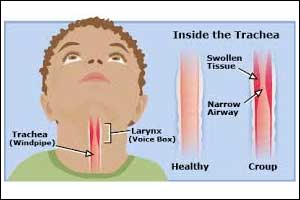- Home
- Editorial
- News
- Practice Guidelines
- Anesthesiology Guidelines
- Cancer Guidelines
- Cardiac Sciences Guidelines
- Critical Care Guidelines
- Dentistry Guidelines
- Dermatology Guidelines
- Diabetes and Endo Guidelines
- Diagnostics Guidelines
- ENT Guidelines
- Featured Practice Guidelines
- Gastroenterology Guidelines
- Geriatrics Guidelines
- Medicine Guidelines
- Nephrology Guidelines
- Neurosciences Guidelines
- Obs and Gynae Guidelines
- Ophthalmology Guidelines
- Orthopaedics Guidelines
- Paediatrics Guidelines
- Psychiatry Guidelines
- Pulmonology Guidelines
- Radiology Guidelines
- Surgery Guidelines
- Urology Guidelines
Steroids improve symptoms,reduce hospital stay in children with croup

Steroids reduced symptoms of croup at two hours, shortened hospital stays, and reduced the rate of return visits to care, reports a systematic review published in Cochrane. Croup causes the throat and windpipe to swell, resulting in hoarseness, a barking cough, and noisy breathing.
Gates A and associates assessed the effectiveness of glucocorticoids for croup in children to determine if they reduced croup symptoms; minimized return visits to care; shortened length of stay; reduced the need for additional treatments, or had side effects.
The investigators searched for related articled till April 2018 and included 43 studies with 4565 children aged up to 18 years.
The glucocorticoids investigated included beclomethasone, betamethasone, budesonide, dexamethasone, fluticasone, and prednisolone. Most studies (26, 60%) compared any glucocorticoid to placebo.
Key review results:
- Glucocorticoids improved croup symptoms at two hours (moderate-certainty evidence), and the effect lasted at least 24 hours (low-certainty evidence).
- Glucocorticoids reduced rates of return visits, admissions, and readmissions (moderate-certainty evidence).
- When treated with placebo, 204 of every 1000 children will return for medical care.
- When treated with glucocorticoids, 74 to 153 of every 1000 children will return for medical care.
- Glucocorticoids reduced the length of stay by 15 hours (range 6 to 24 hours), but made no difference in the need for additional treatments. Of studies that compared glucocorticoids to placebo, 50% collected data on side effects.
- Four studies reported rare occurrences of secondary infections (e.g. pneumonia, ear infection).
- Most other side effects were not severe (e.g. emotional distress, hyperactivity, vomiting).
The previous version of this review reported that glucocorticoids reduced symptoms of croup within six hours whereas according to the present review Steroids reduce symptoms at two hours (moderate-certainty evidence), and the effect lasted at least 24 hours (low-certainty evidence). Glucocorticoids can reduce swelling, reduce the symptoms and make it easier to breathe.
For reference log on to https://www.cochrane.org/CD001955/ARI_glucocorticoids-croup-children

Disclaimer: This site is primarily intended for healthcare professionals. Any content/information on this website does not replace the advice of medical and/or health professionals and should not be construed as medical/diagnostic advice/endorsement or prescription. Use of this site is subject to our terms of use, privacy policy, advertisement policy. © 2020 Minerva Medical Treatment Pvt Ltd